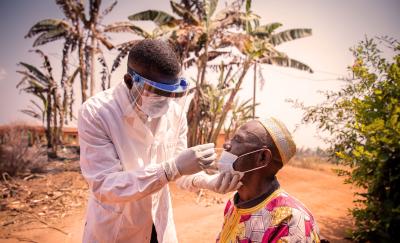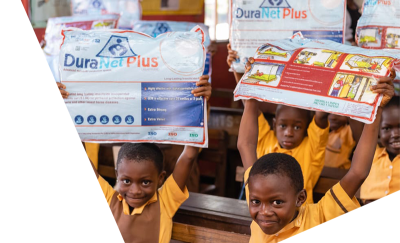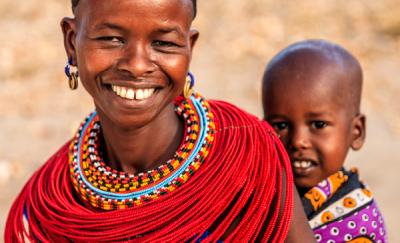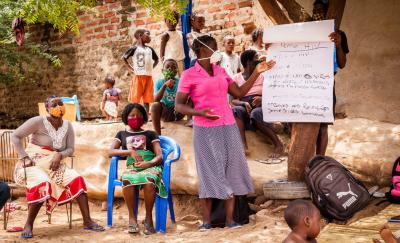Localization Expands and Improves HIV Treatment in Mozambique


It was, Paula Manual thought, a routine ante-natal appointment at a local clinic. It wasn’t. The 27-year-old mother of two emerged with an unexpected diagnosis: HIV positive. Then something else unexpected happened. The community mobilized to help.
Mentoring HIV positive expectant mothers from crisis to healthy baby delivery
After the visit, the clinic assigned her a “mentor mother,” who coached Paula through the emotional process of accepting her HIV status and disclosing her diagnosis to her husband, Armando. A team consisting of a mentor mother—a peer mentor who supports pregnant and breastfeeding women living with HIV— and a community counselor visited the couple at their home, testing Armando and their two children. Armando tested positive, while the two children were negative. And that was not the end of it.
“When I took the HIV test, the mentor mother gave me all the support so that I could continue with the treatment and actively participate in the prenatal consultations,” said Armando, who is taking antiretroviral treatment. “Because of that, my wife and I had a healthy baby.”
Credit the Christian Council of Mozambique (CCM), a community-based organization founded in 1948 that deploys local community health workers to link patients and health facilities, even bringing some services directly to families when needs arise. In Sofala province, CCM’s partnerships with health facilities ensure that patients receive high quality and empathetic counseling and clinical care.
Localization decreases treatment drop-outs and mother-to-child transmission rates
CCM is one community organization of five supported by the Abt Global-led USAID Efficiencies for Clinical HIV Outcomes (ECHO) project that can provide these crucial services thanks to the project’s technical and financial support ECHO began in 2019 when many of those living with HIV were abandoning treatment. ECHO supports basic care and treatment for people living with HIV and seeks to build community capacity for outreach, testing, and counseling. Most important, ECHO adopted a localization approach at two levels: in the community and for the government.
ECHO’s collaboration with CCM shows how community-level localization works. ECHO links facility staff with integrated teams that provide supervision and mentorship to improve care and treatment. The project partners directly with CCM to train and deploy mentor mothers and counselors. We also work with CCM on administrative tasks from budgeting to human resources activities to prepare CCM for eventual direct donor funding.
The results were remarkable as treatment drop-outs and mother-to-child transmission rates declined precipitously from 2019 to 2022. In Sofala, positivity rates for at-risk children whose mothers were diagnosed with HIV dropped by nearly 69 percent, from 7.4 percent to 2.6 percent. While tests that are delayed until late infancy (2-12 months) tend to have much higher positivity rates, early diagnosis at less than 2 months of age most recently dropped to just a 1.3 percent rate of infection, which is an outstanding achievement in the Mozambican context. Patient drop-outs plummeted 71 percent during this period in Sofala as well, from 10,985 to just 3,183.


At the community level, ECHO trains health workers to test eligible members of their community, engage in follow-up to ensure that at-risk patients start and maintain treatment, and connect with their family members and sexual partners to offer them testing services. The strategies require an immense level of trust, and community-based organizations are well placed for this work.
During Paula’s pregnancy, for example, the family received frequent visits from her assigned mentor mother, who offered consultative and emotional support to both Paula and Armando. Once the child was born, the couple administered medicine to their newborn and brought him to at-risk child consultations. By the end of the child’s early childhood preventive treatment, Paula and Armando’s baby tested negative for HIV.
ECHO delivers collaboration and capacity building to enable local self-sufficiency
ECHO isn’t working only with community organizations. It also collaborates with a variety of local entities trying to control the HIV epidemic, such as the Ministry of Health (MOH), Provincial Health Directorates, and Provincial Health Services. And that collaboration is improving local self-sufficiency.
The project started with in-kind grants: ECHO directly purchased essential supplies for health facilities, such as printing routine forms, and provided financial and logistics support for activities such as trainings and supervision.
“ECHO supports the SPS,” said Maria João, HIV service supervisor for Tete SPS, “through assistance to medical facilities, a concrete example being the reorganization of some One-Stop care and treatment offices that provide distinct clinical assistance and psychosocial support.”


Now ECHO is moving into the next phase of localization. At the end of 2022, ECHO transitioned a number of activities from in-kind grants and signed a standard grant agreement with the SPS of each province. The standard grants provide $741,000 in funds, greater financial management autonomy, and opportunities for growth to the SPS. The grants come with robust procurement, financial management, and technical support to improve the quality of care.
The grants will affect the day-to-day operations and efficiency of 149 health facilities in ECHO-supported provinces. The SPS and ECHO coordinated in deciding how to spend the funds. Uses include cervical cancer screening, psychosocial counseling, reaching key populations, data monitoring and decision-making, and ensuring male engagement in maternal and child health. The goal is to build the capacity of each SPS and DPS to exercise training and supervision activities through full standard grant agreements and, eventually, to absorb portions of PEPFAR funding directly.
ECHO will continue to work with the SPS in each supported province, holding weekly coordination meetings and co-locating with each provincial SPS once a week to encourage skill transfer and an organic, learning-through-doing approach to capacity strengthening.
Mozambique’s national and provincial government entities and community-based institutions and workers have built the capacity to lead ongoing efforts to stem the scourge of HIV. ECHO remains available to help, but in the background. If current trends continue, Mozambique will lead this important fight.
Read More
Infectious Diseases & Global Health Security in Sub-Saharan Africa

Global Health Security: 2024 Year in Review
Abt Global’s top global health security insights from 2024 as we look ahead to 2025.

The 2024 Annual Meeting of the American Society of Tropical Medicine & Hygiene (ASTMH)
Abt Global is presenting and exhibiting at the 2024 Annual Meeting of the American Society of Tropical Medicine & Hygiene (ASTMH).

Global Health Newsletter November 2024
In a Complex Country, What’s Working for Better Health Peru Approves Groundbreaking Law to Extend Health Coverage for Migrants with HIV and TB Furthering Jamaica’s One Health Approach New Evidence for Patient-Centered HIV Service Delivery Approaches in Mozambique Funding Model Helps Bangladesh Expand Primary Health Care Centering Community at the Heart of ITN Distribution Campaigns in Côte d’Ivoire Tackling Antimicrobial Resistance: Integration and Systems Strengthening Spotlighting the Power of Solar for Primary Health in Nigeria’s Off-Grid Communities Global Migration and Health: Beyond a Humanitarian Response Scaling Innovative Locally Led Solutions to Global Health Security Threats in Madagascar Transforming Healthcare Systems in Tanzania Through Digitalization

Insights and Approaches from Five Years of Addressing HIV Epidemic Control in Mozambique
The ECHO project is advancing HIV epidemic control in Mozambique through innovative approaches, local empowerment, and sustainable strategies for testing, treatment, and viral load suppression